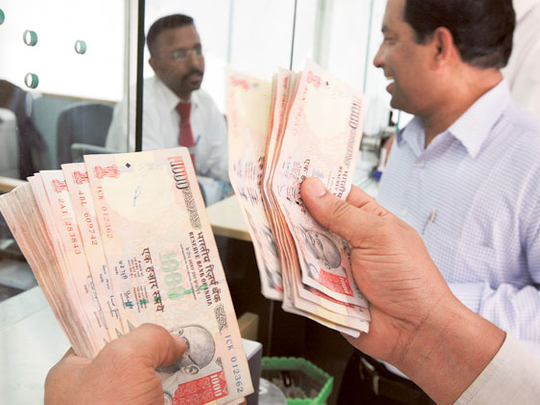
Abu Dhabi: Non-Resident Indians (NRIs) will have to pay slightly more to remit money to India as the government of India has imposed a service tax on “fees or commission” levied by banks and financial institutions for facilitating remittances from abroad.
The move will not pose a big burden for expatriates as a 12.36 per cent service tax is imposed only on the “fee or commission charged by banks for facilitating remittances” and not on the actual remittance.
Although the previous Manmohan Singh government had made a similar move in 2012, it had to withdraw the tax proposal following widespread protests from NRIs.
Service tax
A circular issued by India’s Central Board of Excise and Customs (CBEC) late on Tuesday said banks and financial institutions have to pay a service tax for the fee or commission they levy for facilitating money transfers from abroad, a prominent financial consultant in Mumbai told Gulf News by phone on Wednesday.
Although the service tax is imposed on banks and financial institutions, they will not pay it from their own pocket but will pass it on to customers, said Sachin Menon, chief operating officer, tax and regulatory services at KPMG in Mumbai, a prominent financial advisory in India.
Although he did not know the exact fee or commission charged by Indian banks and financial institutions on NRI remittances, he said the banks can deduct that amount from the remittances.
But banking sources told Gulf News that the tax may be around Rs100 (Dh5.98).
Currently money exchange centres in the UAE charge a flat fee of Dh20 for a single transaction of money remittance to India. Once the new tax is levied, it is not clear whether NRIs have to pay the additional amount in the UAE or in India.
Menon said although the amount is small, it will affect the majority of the NRIs who are low-income workers. Even a small deduction will affect the small amounts they regularly remit home.
Top recipient
India topped the recipients of remittances among developing nations in 2013. It is estimated that 80 per cent of Indian expatriates in the Gulf are low-paid workers. They contribute most of the remittances from the Gulf to India, which are estimated at 50 per cent of around $71 billion (Dh260.79 billion) of total remittances India received in 2013. Remittances from the UAE to India last year stood at $15 billion.
The new circular issued by the government is a revision of the policy announced by the previous government in 2012, Menon said.
The 2012 move was based on rules passed by the parliament, which was withdrawn by a clarification issued by the government. “That clarification left room for this reintroduction of the tax. The government had to amend the very rule by exempting the fee or commissions on NRI remittances,” the financial consultant said.
Asked when the tax will be levied, he said all circulars are subject to clarifications and even the tax authorities can collect the tax with retrospective effect.
The move is taxing NRIs indirectly. “That’s why it [service tax] is called an indirect tax,” Menon said.
When contacted, the Indian Embassy in Abu Dhabi said it did not have any information about the new tax proposal.











